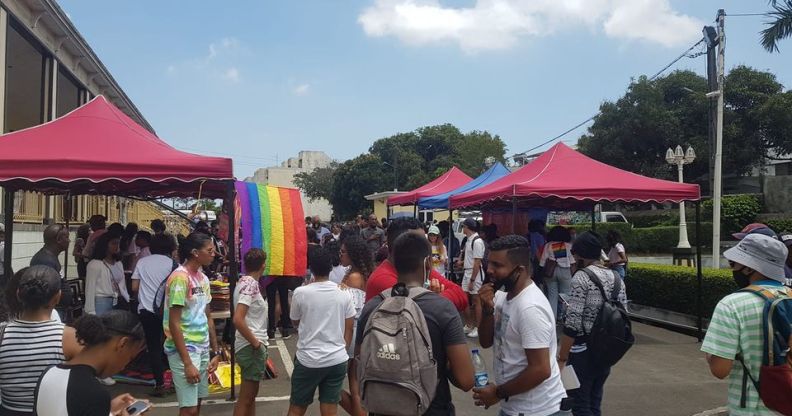Mauritius defiantly celebrates Pride with a kaleidoscopic march and calls for an end to its colonial-era gay sex ban

Mauritius Pride March, October 10 2020 (collectifarcenciel.org Facebook page)
Mauritius hosted a rare, kaleidoscopic LGBT+ Pride parade amid the COVID-19 pandemic, calling on lawmakers to decriminalise same-sex relations.
The LGBT+ Pride event, which took place on Saturday (October 10), was organised by the Collectif Arc-en-Cieland.
It saw more than 500 people march the streets in hopes of being heard, recognised and seen. Mauritius is considered COVID-free thanks to stringent measures imposed earlier on in the year, but attendees were encouraged to wear masks.
The theme of the Pride march was “Eski to tann mwa?”, translating to the powerful message: “Do you hear me?”.
Organisers and Pride-goers protested Section 250 of the penal code, which criminalises same-sex relations.
Under the colonial-era law, men who are found to have had sex with other men can be imprisoned for up to five years. There is no ban on same-sex relations between women.
Director of Collectif Arc-en-Ciel (CAEC) Anjeelee Kaur Beegun said: “We have been advocating for equal rights for LGBT [people] for 15 years.
“We have had significant victories such as the Equal Opportunities Act and the Worker’s Rights Act, which prohibits discrimination based on sexual orientation, but true equality is still our goal.”
Beegun also commented on how the criminalisation of same-sex activity is “used to stigmatise and threaten LGBT+ people”. She also noted the lack of protections for transgender people, adding that homophobia and transphobia remain very common in Mauritius.
“We hope that through this march we are able to sensitise decision-makers and the population about the harsh realities of LGBT+ people and compel them to be more empathetic,” Beegun said.
The London-based organisation, the Peter Tatchell Foundation, assisted the CAEC in organising the Pride event.
Pliny Soocoormanee, a Mauritian LGBT+ campaigner, said people marched in the hopes of building “a real rainbow nation” and to push for a more tolerant and inclusive society in Mauritius.
“We are part of a wave of change. LGBT+ liberation can be delayed but won’t be denied.”

